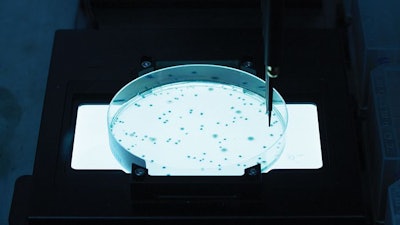
Layer producers faced with unique flock health challenges are finding new probiotic tools appearing in the marketplace, as well as traditional autogenous vaccine and bacterin products to be helpful in the combat against illness.
These products can be customized for egg producers to meet the health challenges of a specific farm or operation. These tools are becoming more important for several reasons: consumer pressures have reduced antibiotic use, old diseases re-emerge as production systems change, variants continue to evolve, and access to conventional products may be limited during disease outbreaks.
Probiotic, enzyme producers offering customer-specific products
Jordon Gruber, microbial business manager of DuPont Animal Nutrition, said Bacillus strains contained in their standard product are well studied and have been shown to be effective against a wide variety of challenging pathogens. However, their gut sampling work has shown some differences in bacterial pathogens which led to the development in the U.S. of a product called Enviva CSI (customer specific inocula).
Gut samples are collected from a customer’s farm and analyzed in the laboratory with a polymerase chain reaction (PCR) test to determine if any of 10 different virulence genes are present. If needed, whole genome sequencing may also be done to further classify the farm’s bacterial challenge. These tests are then compared to the Bacillus strains library to assess and offer the best strains to protect birds against specific pathogens present on the farm.
“Wide varieties of pathogenic bacteria create quite diverse challenges from company to company and even complex to complex,” said Chris Kromm of Arm & Hammer. The bacterial load (quantity) and genetic makeup contribute to this diversity.
The benefits of a customized approach will focus on the farm challenge and maximize the effect of a custom product. An interesting opportunity for layer companies is to target subclinical pathogenic challenges. These challenges affect bird health and performance but may not be observed as a clinical disease. It is not until a successful intervention strategy is implemented that the true effects of the subclinical challenges are evident.
Customized products containing proprietary Bacillus strains are also offered by Arm & Hammer. The customized process begins by understanding the microbiome of a customer’s birds from the day of hatch to pullet to lay. After analyzing gut and environmental samples, molecular work is done to analyze the microbial community to better understand the presence of beneficial and pathogenic bacteria that affect the bird’s ability to defend itself against disease challenge.
A tailored solution is developed for a farm using Arm & Hammer’s proprietary Bacillus as a feed additive. The program is sometimes supplemented with a Lactobacillus and Bacillus combination product administered in the drinking water during times of stress. Ongoing monitoring of the farm’s microbiome is offered to continue to better understand the changes after starting a new probiotic program.
Well-studied feed enzymes are generally classified as nutritional products and are commonly used to improve the digestibility of feed ingredients. Emerging research is pointing also to the possible prebiotic activity of some enzymes. Manufacturers are offering products combining multiple enzymes or enzymes and probiotics in standard and customized products, which merit mentioning as new alternatives.
Enzymes have very unique modes of action, so specific feed formulations may require different combinations and levels for optimum benefits. Several newer enzymes are on the market offering more choices to handle specific feed formulation challenges. Enzyme combinations with probiotics offer even more alternatives which make field evaluation more challenging with two or more active ingredients. Most research is manufacturer generated and the proliferation of products further complicates assessing their real potential.
















